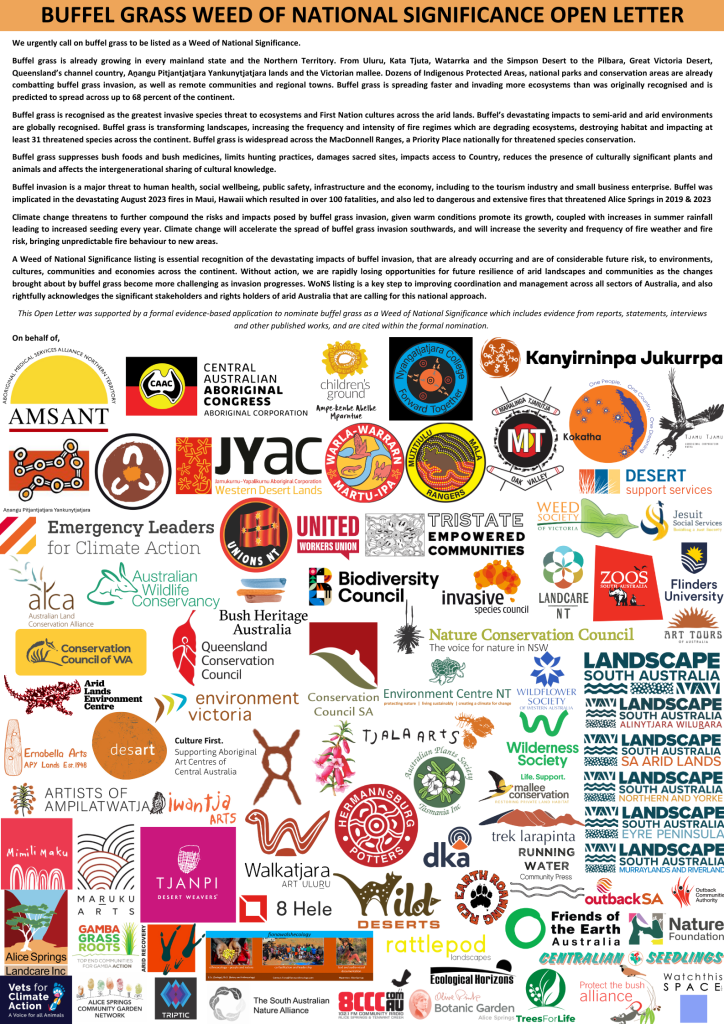Buffel as a weed of national significance – there is already consensus! : Ellen Ryan-Colton
July 11, 2025Dr. Ellen Ryan-Colton, co-author of the WONS submission and author of a PhD Thesis on the impacts of buffel grass on arid ecosystems. Email: ellen.ryan.colton@gmail.com
Listing Buffel Grass as a Weed of National Significance has consensus. It has consensus among 83 organisations, representing many rightsholders, stakeholders, on-ground managers, small business holders, knowledge holders and major players in the rangelands of Australia. These 83 organisations signed the Open Letter in support of listing Buffel Grass as a WONS, in January 2025. Quite simply, these organisations represent a considerable diversity of Australia’s rangelands, they remind us that there are so many interests, values and opportunities for the future of rangelands, and these groups are united behind the challenge of buffel grass.
__________________________________________________________
Consensus on impacts
There is no debate amongst these 83 organisations. They recognise buffel grass as an extensional threat to livelihoods, future economies and environment across all mainland states and the NT. The 60,000 years of knowledge is in, the science is in, the personal experience is in – buffel is now invading millions of hectares of land off the pastoral estate, and is impacting everything from soils and water retention, from insects to higher fauna, to major ecosystem processes such as shifting fire regimes. Accompanying changes to our environment, are documented impacts to human health, cultural knowledge transfer and human well-being, liveability, economic viability and human safety, all because of this high biomass grass that forms absolute monocultures in some of our most arid areas. These socio-ecological impacts are not in doubt, and fits all the definitions of a Weed of National Significance. Interestingly, anyone who wishes to see first-hand the scale of the infestation and impacts, only needs to travel to northern South Australia, central Australia, the Pilbara, outback Queensland, and recently to western NSW and into Victoria.
Moving forward
The challenge now is to remove any roadblocks to action, bringing all groups together, whilst not delaying management any longer. Therefore, we need two pathways at the same time. The only remaining large stakeholder for the rangelands that is uncertain or opposed to listing buffel grass as a weed is the pastoral sector. As you can see from the Open Letter, everyone else is on board. Let’s duly recognise pastoralists knowledge and experience and learn from each other, learn about how pastoralists manage fire in their buffel, consider how native pastures might benefit all, share what successful management looks like on pasture. But while we take the time to start those conversations, truly share knowledge and experience, and create safe spaces for mature discussions, we cannot delay action off pasture. We must act now before it’s too late. So listing Buffel Grass as a WONS actually invests in both pathways. It achieves national recognition and a national space for proper engagement. It invests is action we know we can achieve straight away. It attracts national capabilities for better mapping, better science, better management options. The WONS program is the most well recognised platform for addressing major weeds of Australia. It will draw attention to this issue, in a way that no other brand can. Therefore, it is better for pastoralists to jump on the band wagon and join us in defining the priorities, and solutions, be it more research into buffel dieback or nutrition or other emerging issues, rather than be the squeaky wheel in a train that has well and truly left the station and is on the way to a brighter, diverse rangelands for all.
Diverse rangelands unified behind buffel
The Open Letter pictured here expresses the grave risk to communities and our life support system if buffel is left unchecked, but also the unification of many groups within our diverse rangelands community. Let’s remove the roadblocks and get on with it – first step WONS recognition. Second step, making sure everyone is engaged, being heard and activated. Third step, actually managing this beast! We need the best minds on the job! Will a grass divide us and our rangelands, or bring us together?

Submitted: 1 June 2025
Categories
- Buffel grass Special Issue: Range Management Newsletter 25/2 (11)
- members area (11)
- News (35)
- Range Management Newsletter 15/2 (10)
- Range Management Newsletter 15/3 (12)
- Range Management Newsletter 16/1 (12)
- Range Management Newsletter 16/2 (9)
- Range Management Newsletter 16/3 (13)
- Range Management Newsletter 17/1 (15)
- Range Management Newsletter 17/2 (10)
- Range Management Newsletter 17/3 (12)
- Range Management Newsletter 18/1 (11)
- Range Management Newsletter 18/2 (13)
- Range Management Newsletter 18/3 (14)
- Range Management Newsletter 19/1 (15)
- Range Management Newsletter 19/2 (13)
- Range Management Newsletter 19/3 (11)
- Range Management Newsletter 20/1 (17)
- Range Management Newsletter 20/2 (20)
- Range Management Newsletter 20/3 (14)
- Range Management Newsletter 21/1 (17)
- Range Management Newsletter 21/2 (20)
- Range Management Newsletter 21/3 (21)
- Range Management Newsletter 22/1 (16)
- Range Management Newsletter 22/2 (17)
- Range Management Newsletter 22/3 (16)
- Range Management Newsletter 23/1 (16)
- Range Management Newsletter 23/2 (17)
- Range Management Newsletter 23/3 (14)
- Range Management Newsletter 24/1 (17)
- Range Management Newsletter 24/2 (14)
- Range Management Newsletter 24/3 (16)
- Range Management Newsletter 25/1 (12)
- Range Management Newsletter 25/3 (14)